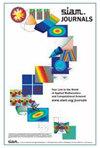高斯过程插值中平滑参数估计的渐近界
IF 1.9
3区 工程技术
Q2 MATHEMATICS, INTERDISCIPLINARY APPLICATIONS
引用次数: 6
摘要
SIAM/ASA不确定度量化杂志,第11卷,第4期,1225-1257页,2023年12月。摘要。通常将确定性响应函数(例如计算机实验的输出)建模为具有mat本文章由计算机程序翻译,如有差异,请以英文原文为准。
Asymptotic Bounds for Smoothness Parameter Estimates in Gaussian Process Interpolation
SIAM/ASA Journal on Uncertainty Quantification, Volume 11, Issue 4, Page 1225-1257, December 2023.
Abstract. It is common to model a deterministic response function, such as the output of a computer experiment, as a Gaussian process with a Matérn covariance kernel. The smoothness parameter of a Matérn kernel determines many important properties of the model in the large data limit, including the rate of convergence of the conditional mean to the response function. We prove that the maximum likelihood estimate of the smoothness parameter cannot asymptotically undersmooth the truth when the data are obtained on a fixed bounded subset of [math]. That is, if the data-generating response function has Sobolev smoothness [math], then the smoothness parameter estimate cannot be asymptotically less than [math]. The lower bound is sharp. Additionally, we show that maximum likelihood estimation recovers the true smoothness for a class of compactly supported self-similar functions. For cross-validation we prove an asymptotic lower bound [math], which, however, is unlikely to be sharp. The results are based on approximation theory in Sobolev spaces and some general theorems that restrict the set of values that the parameter estimators can take.
Abstract. It is common to model a deterministic response function, such as the output of a computer experiment, as a Gaussian process with a Matérn covariance kernel. The smoothness parameter of a Matérn kernel determines many important properties of the model in the large data limit, including the rate of convergence of the conditional mean to the response function. We prove that the maximum likelihood estimate of the smoothness parameter cannot asymptotically undersmooth the truth when the data are obtained on a fixed bounded subset of [math]. That is, if the data-generating response function has Sobolev smoothness [math], then the smoothness parameter estimate cannot be asymptotically less than [math]. The lower bound is sharp. Additionally, we show that maximum likelihood estimation recovers the true smoothness for a class of compactly supported self-similar functions. For cross-validation we prove an asymptotic lower bound [math], which, however, is unlikely to be sharp. The results are based on approximation theory in Sobolev spaces and some general theorems that restrict the set of values that the parameter estimators can take.
求助全文
通过发布文献求助,成功后即可免费获取论文全文。
去求助
来源期刊

Siam-Asa Journal on Uncertainty Quantification
Mathematics-Statistics and Probability
CiteScore
3.70
自引率
0.00%
发文量
51
期刊介绍:
SIAM/ASA Journal on Uncertainty Quantification (JUQ) publishes research articles presenting significant mathematical, statistical, algorithmic, and application advances in uncertainty quantification, defined as the interface of complex modeling of processes and data, especially characterizations of the uncertainties inherent in the use of such models. The journal also focuses on related fields such as sensitivity analysis, model validation, model calibration, data assimilation, and code verification. The journal also solicits papers describing new ideas that could lead to significant progress in methodology for uncertainty quantification as well as review articles on particular aspects. The journal is dedicated to nurturing synergistic interactions between the mathematical, statistical, computational, and applications communities involved in uncertainty quantification and related areas. JUQ is jointly offered by SIAM and the American Statistical Association.
 求助内容:
求助内容: 应助结果提醒方式:
应助结果提醒方式:


